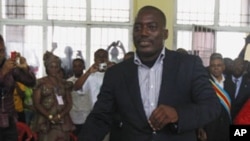The U.S.-based Enough Project has called on the international community to help break what it calls the cycle of impunity in the Democratic Republic of Congo by supporting those who wish to reform the country’s justice system.
In a new report entitled: Time Works against Justice: Ending Impunity in Eastern Congo, the group said a lack of accountability has fostered a war in eastern Congo that has killed more than five million people.
Aaron Hall, the Enough Project Congo policy analyst and co-author of the report, said the lack of accountability for war crimes is an obstacle to peace and development.
“In Eastern Congo, and in Congo as a whole, there is a substantial problem with impunity. What you see is a number of individuals, [who] are in positions of power, who continuingly exploit institutions in Congo, exploit communities and engage in regular violence and extortion, and there is rarely penalty for their actions. And, this sends a signal to others within Congo, and within the region, that engaging in [certain] behaviors is not only something that you won’t get punished for, but likely will benefit you in a long run,” he said.
Hall said reforming Congo’s justice system will call for rebuilding it from the ground up because the system is saddled with many problems, including dilapidated court houses and corruption among judges, prosecutors and lawyers.
“From the systemic procedures within the justice system, from arresting someone, to pretrial detention, to having a trial, all those steps along the way, there is a real lack of capacity, there’s a real lack of capacity, there’s a real lack of transparency and accountability, and there’s a real of lack of resources,” Hall said.
The report also calls on the international community to use a multi-pronged approach of state-level, conditionally-based pressure and civil society support to ensure Congo implements what it calls Specialized Mixed Courts to try human rights crimes committed in Congo that fall outside the jurisdiction of the International Criminal Court.
“The conditionally-based pressure and the multi-pronged approach that I was talking about was those donor communities that work continually with Congo to urge Congo leaders to introduce that legislation once again and make sure that it is passed and implemented, so that some of these war crimes, human rights abuses, that occurred within that period are brought to justice,” Hall said.
The report recommends that pressure is applied on Congolese and Rwandan leaders to arrest indicted war criminal Bosco Ntaganda, currently a general in the Congolese army.
“He is an ICC indicted war criminal for the recruitment of child soldiers in 2002. He is the poster child, if you will, for impunity in Congo, and he continues to perpetrate human rights abuses, exploit natural resources, extort communities in eastern Congo, and essentially flies in the face of any kind of reform, whether it be in the justice sector, the security sector, the resource management sector, not only in eastern Congo, but in Congo as a whole,” Hall said.




